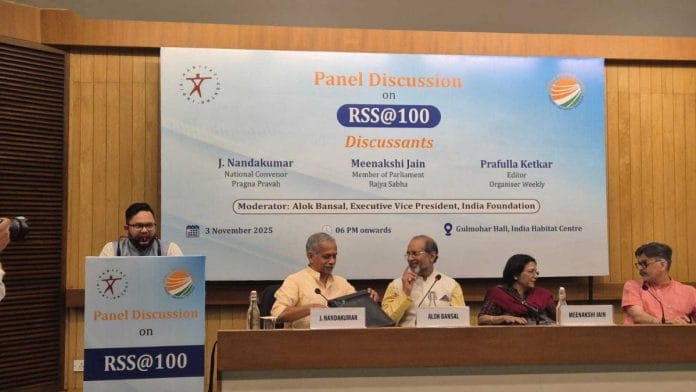New Delhi: The RSS@100 discussion, hosted by the India Foundation at the Gulmohar Hall in India Habitat Centre, drew a full house. The three key speakers—Prafulla Ketkar, the editor of Organiser; Meenakshi Jain, a Rajya Sabha MP; and J Nandakumar, National Convenor of Prajna Pravah—were gathered to deliver speeches on the upcoming centenary of the Rashtriya Swayamsevak Sangh (RSS).
Ketkar spoke on the RSS as a thought, dimension, and movement, while Jain elaborated on the efforts of 20th-century karyakartas (workers) for documenting the Ram temple records. Nandakumar, meanwhile, declared the agenda of the next 25 years of the RSS, which includes changing the very fabric of the country.
“The next 25 years, the Sangh will be concentrating on systemic change of this great nation. We’ll make the nation the lord wants. We have to change the system that is working here, made by the invaders of this nation; we have to change the framework through which we work for everything,” he said without offering more details.
The question that generated the most debate among both the audience and the panelists was caste. As the Sangh speaks of reshaping India’s DNA, how does it plan to address this issue? Is caste the great divider or potential unifier? Seemingly, upper-caste members of the panel and the audience locked horns over the same question.
Also read: At elite Doon summit, old boys grapple with ‘egalitarianism’ and ‘aristocracy of service’
Mental block or social structure?
It all started when an audience member asked if the caste structure in India was to be eliminated, and what kind of structure the RSS envisioned in its place in modern Hindu society.
Ketkar located the debate on casteism in British rule, but clarified that he was not suggesting that untouchability did not exist before the colonial era.
He then illustrated RSS founder Keshav Baliram Hedgewar’s view on caste: “In 1936, Dr Hedgewar had organised an RSS shivir (camp), for the first time outside Maharashtra. All castes were invited. Two people who were from the SC community were located and some members refused to have a meal with them. Hedgewar told them it was their choice, but that he himself was going to sit and break bread with the Dalits,” Ketkar said.
Ketkar insisted that even former Sarsanghchalak MS Golwalkar, who is seen as a champion of the varna system, had maintained that caste-based discrimination is not present in Hindu scriptural sanctions.
“The social harmony issue (when it comes to caste) is a mental block, rather than a social structure,” Ketkar said, adding that the RSS has consistently upheld that untouchability is a sin.
To this, the moderator, Alok Bansal, interjected, stating that it does not matter how many castes exist. “As long as caste exists, discrimination exists; the caste system is inherently discriminatory,” he said.
One audience member then attacked caste-based reservations, adding that if caste has to be ‘annihilated’, then reservations should stop, and caste surveys should end.
“RSS is very clear,” Ketkar said, “when it comes to access to water, access to temples, and access to crematoriums, there should not be any caste-based discrimination,” he added.
J. Nandakumar concluded the discussion: “We have to deal with these questions philosophically and practically. If caste is there, casteism is also there, and how do we tackle it,” he added.
(Edited by Ratan Priya)






